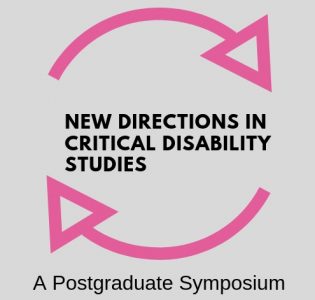Call for Papers
Leading scholars, Goodley, Liddiard and Runswick-Cole (2018, p. 206) describe Critical Disability Studies (CDS) as a ‘nascent field of scholarship and activism that explicitly engages with transformative fields of inquiry including queer, postcolonial, indigenous and feminist studies.’ In this way, this continually emerging and developing field urges us to rethink, question, and disrupt boundaries of the human. It asks us to consider how, and why, such rigid boundaries have been created, and to what consequences, and to whom, are produced.
Developing work around the concept of ableism has been, and continues to be, integral to the field of CDS. Notably, the work of Fiona Kumari Campbell has paved the way for unearthing, and confronting, the beliefs, processes and practices that produce a particular kind of self and body – the corporeal standard (Campbell, 2009). It is not just disabled people who occupy an Other space to this standard, but also women, children, queer, people of colour and poor people (Goodley, 2013). Thus, although CDS starts with disability to rethink the category of the human, it does not do this in isolation. CDS starts with disability to enable an open and critical space that grapples with a range of political, theoretical, and practical issues that are relevant to all (Goodley, 2011). Such an approach is not concerned with binary understandings of the human condition, but rather, the continuous and undefined ‘becoming’ of bodies, and the complex intersectional experiences that accompany this process (Meekosha & Shuttleworth, 2009). The intersectional work of CDS is particularly important within the context of creeping ‘neoliberal-ableism.’ Such a context regulates the narrow notions of personhood and body management held within ableist standards, within which we are expected to be ‘independent,’ work-ready and economically productive (Goodley, Lawthom & Runswick-Cole, 2014). Working to contest, challenge and disrupt such normative modes of thinking, CDS poses a number of questions.
What does it mean to be human? And what does it mean to be pushed to the peripheries of its borders? How might we confront these borders and rethink the dominant territory of the ‘normal’ human? How, as a collective of postgraduate researchers, can we have honest and open conversations about what the human is, isn’t, and could be?
This one-day symposium invites postgraduate researchers to engage with some of these questions as they relate to their own research projects. The day offers the exciting possibility of learning with and from one another to think about the different directions that are now being taken within critical disability studies. Each speaker will offer a unique contribution to the day, drawing upon the theoretical and methodological frameworks of their PhD project. This call for papers, then, is intentionally broad in order to provide an open and flexible space for these new directions to be debated and discussed. While broad, presenters are brought together through their interest in both developing, and initiating, new directions in critical disability studies and are asked to draw connections to the ongoing work of the ‘iHuman’ institute.
Based at the University of Sheffield, ‘iHuman’ is a collective of academics, community groups and third sector organisations initiating tricky conversations and promoting innovative thinking around what it means to be human in the modern world. iHuman forges interdisciplinary connections between the social sciences, the humanities and STEM subjects to think about the human across a number of intricately interlinked themes: Dis/abled humans, Biological Altered Humans, Living and Dying Humans, Enhanced Humans, Performing Humans, Human Rights, Science, Public and the Human. The institute hosts a number of projects, including those lead by leading scholars in CDS, such as Katherine Runswick-Cole, Kirsty Liddiard and Dan Goodley. The many themes encompassed within iHuman offer an exciting framework to begin to explore the new directions taken by postgraduate researchers to enhance the level of critical and reflective thinking within CDS, as well as the practical impact this can have to the lives of us all.
We welcome proposals from postgraduate researchers who position their work within the field of CDS. We are interested in exploring some of the new directions you are taking this field within the unique parameters of your PhD topic. Abstracts should be between 150 and 200 words.Please send your abstract to Leah Burch sslfb@leeds.ac.uk on or before Wednesday 13th March, 2019. We aim to respond to you by Monday 15th April with our decisions. If you have any questions about the event, please feel free to get in touch.
#newdirCDS
Registration information will be provided closer to the date.
